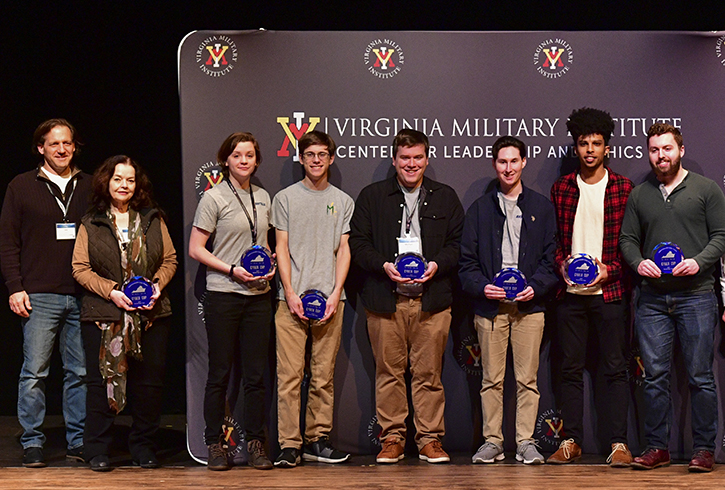
Mason Competitive Cyber club won second place in the Commonwealth Cyber Fusion Competition 2019 last weekend at the Virginia Military Institute in Lexington, Virginia.
“We did a great job in an extremely tight competition. A lot of the challenges we did this year are similar to things we would do in the real world in our respective fields.”
— Michael Bailey, Mason Competitive Cyber president
The Mason Competitive Cyber club captured second place in the Commonwealth Cyber Fusion Competition 2019 over the weekend. The University of Virginia came in first.
George Mason University was one of 17 schools that competed in the invitation-only competition for Virginia community colleges and universities that are National Centers of Academic Excellence in Cyber Security. The event was held at the Virginia Military Institute in Lexington, Virginia.
“We did a great job in an extremely tight competition,” says Mason Competitive Cyber president Michael Bailey, a senior majoring in IT. “A lot of the challenges we did this year are similar to things we would do in the real world in our respective fields.”
The intense four-hour competition involved solving a variety of complex cyber challenges designed to model real-world computer security challenges, including hacking into websites, performing reverse engineering on programs, wireless hacking, analyzing network traffic, and deciphering encrypted messages.
Other members of Mason’s team included Chris Issing, Zaine Wilson, Ammar Al-Kahfa, Paul Benoit, and Niki Carroll.
Mason’s observing student team members Andrew Oliveau and Connor Perkins placed first in their bracket in a parallel challenge.
“I am very proud of our Mason competitors,” says head coach Peggy Brouse, director of Mason’s bachelor of science in cyber security engineering program.
“It is especially rewarding that we had students from several programs within the Volgenau School of Engineering, including computer science, cybersecurity, and information technology. Thanks to the Mason Competitive Cyber club for being instrumental in preparing students for various cyber competitions. I look forward to next year.”
Assistant coach Jim Jones, an associate professor in the digital forensics and cyber analysis program in the Electrical and Computer Engineering Department, says of Mason's team: "These students combine deep technical knowledge, tool expertise, creative thinking, and teamwork to solve problems, precisely the skills employers are looking for."
The goal of the event, sponsored by the Virginia Cyber Range and Senator Mark R. Warner, is to develop the next generation of cybersecurity professionals in Virginia. Students participated in cyber challenges, learned from industry professionals, networked, and attended a cyber job fair.
Mason Engineering has 17 cyber-degree programs, including a first-of-its-kind bachelor of science in cyber security engineering, multiple master’s degrees in cybersecurity-related fields, graduate certificates in cybersecurity, and an interdisciplinary PhD in information technology with concentrations in information security and assurance as well as digital forensics.
“I am very proud of our Mason competitors. It is especially rewarding that we had students from several programs within the Volgenau School of Engineering, including computer science, cybersecurity, and information technology.
— Coach Peggy Brouse, director of Mason’s bachelor of science in cyber security engineering program.
"These students combine deep technical knowledge, tool expertise, creative thinking, and teamwork to solve problems, precisely the skills employers are looking for."
— Jim Jones, assistant coach and faculty advisor for Mason Competitive Cyber
